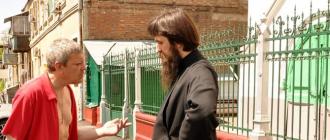Jeremiah 18:13
“Each of us intends to do what his evil and stubborn heart wants”...
Not all dreams are from God, not every guidance, and not every experience. When we follow the path of the cross, only then will we approach the narrow and true path. On this path we learn to reject our will and choose Him... Sometimes it costs us considerable effort, sometimes we become a victim, since God wants us to be ready to suffer for His righteousness...
This is the path, and therefore not everyone will want to follow the path, but only those who have responded to the call of the Lord - “take up your cross and follow Me”...
But we often dream a lot about ourselves. Not all desires that are born in our hearts are born of His Spirit. Our desires and requests are sanctified by the fire of the Holy Spirit and much is burned, like hay and straw in this fire...
James 4:2,3
“2...You don't get what you want because you don't ask God.
3 But when you ask, you do not receive, because you ask from unrighteous motives, only in order to take advantage of everything you receive for your own pleasure ... "
This is the main reason - they left the path of the cross, because of this there is so much murmuring and they cannot enter into His rest...
Being led by the Spirit has nothing to do with the desires and promptings of lust. These desires must remain on the cross, but when we are overcome by them, then this is, strictly speaking, a fall...
Therefore, if we run after these desires, we will stumble. That is why the Pharisees stumbled over the Rock, which is Christ. He did not fulfill their expectations, and they became hardened in their hearts...
We don't need to have expectations, we need to have faith and trust in God. What comes from Him brings peace and joy to hearts. But joy is not carnal enthusiasm. Often we become inflamed with carnal desires and fall again. No, this is not that kind of joy, but rather one that brings peace to our hearts...
Also dreams and some visions. What do they bring to the heart? You need to check the Source. We learn everything.
Eccles.5:7
“Let not dreams, all sorts of uselessness and verbosity prevent you from honoring God”...
Many dreams only hide the true God. Not all. In the end, Joseph’s dream was from God, but probably in his heart he still had many dreams of his own, and God led Joseph to the places of smelting. We should not add anything to what God has said. This is meekness. Moses went in his own strength to save Israel, and we know how that ended. Then he became the meekest in the desert.
Prophetic experiences are sometimes similar to creative dreams, but only in imagery, because the prophets were sensitive, and sometimes recorded their experiences in the form of songs and psalms. But God also cleansed their lips, like the lips of the prophet Isaiah.
So, the grain must be separated from the chaff. He who speaks the word from God must not add anything of his own. Visions are still chaff, just like dreams…. They need to be checked, compared with scripture, because there may be a lot more added by man.
Ecl.5:3
“Because of great excitement there are bad dreams, and stupid people always have more words than they need”...
The Fire of the Holy Spirit will cleanse us all from this husk...
1–15. Parables of various contents about wealth and poverty, about prudence and stupidity, etc. 16–29. Parables related in content to charity, education, etc.
. Better is a poor man who walks in his integrity than a [rich] man with lying lips and a fool at that.
. It is not good for a soul without knowledge, and those who are in a hurry will stumble.
. Man's stupidity perverts his path, and his heart is indignant at the Lord.
. Wealth brings many friends, but the poor man remains his friend.
. A false witness will not go unpunished, and whoever tells a lie will not be saved.
. Many curry favor with nobles, and everyone is a friend to the person who gives gifts.
. The poor man is hated by all his brothers, and even more so his friends move away from him: he chases after them to talk, but that doesn’t happen either.
. He who gains understanding loves his soul; whoever observes prudence finds good.
. A false witness will not go unpunished, and whoever tells a lie will perish.
. Splendor is indecent for a fool, much less for a slave to have dominion over princes.
. Prudence makes a man slow to anger, and it is his glory to be lenient towards wrongdoing.
. The king's anger is like the roar of a lion, and his favor is like dew on the grass.
. A foolish son is his father's ruin, and a contentious wife is a waste pipe.
. House and property are an inheritance from parents, and a reasonable wife is from the Lord.
. Laziness makes you drowsy, and a careless soul will suffer hunger.
Art. 1 is repeated almost verbatim in - with the difference that in this last place in the second half of the verse there is the word “rich” - ashir, not “stupid” – kesil, like here. Only the reading corresponds to the context of speech, which is why the reading of a given passage should be corrected accordingly, as they do in LXX, Vulg., slav. 2–3 tbsp. highlight the idea that well-being is possible for a person only with prudence and prudence. Art. 4, 6–7 note the always and everywhere present phenomenon of everyday experience - the fact of the universal admiration of people for wealth and the rich and disdain for the poor (fn.). Art. 5 contains an interpolated thought about the crime of perjury (cf.); about the same thing - and Art. 9. Art. 10 refers to the frequent cases in the ancient and modern East of the instant elevation of a slave to the position of ruler; The Wise One condemns such a phenomenon not in itself, but insofar as physical slavery can easily be combined with slavery of the spirit, in particular with stupidity; The idea is that for the possession of goods - wealth, power and the like - there must be preparation in the form of education. Art. 11–15 contain a number of empirical observations from the areas of private, public and political life.
. He who keeps the commandment preserves his soul, but he who is heedless of his ways will perish.
. He who does good to the poor lends to the Lord, and He will reward him for his good deed.
. Punish your son while there is hope, and do not be indignant at his cry.
. Let the angry one suffer punishment, because if you spare him, you will have to punish him even more.
. Listen to advice and accept reproof, so that you may later become wise.
. There are many plans in the human heart, but only those determined by the Lord will take place.
. A man's joy is his charity, and a poor man is better than a deceitful one.
. The fear of the Lord leads to life, and whoever has it will always be content, and evil will not befall him.
. The lazy person puts his hand into the cup and does not want to bring it to his mouth.
. If you punish a blasphemer, then the simple will become prudent; and if you rebuke a wise man, he will understand the instruction.
. He who ruins his father and drives out his mother is a shameful and dishonest son.
. Stop, my son, listening to suggestions about evading the sayings of reason.
. The wicked witness mocks the court, and the lips of the wicked swallow lies.
. Judgments are ready for those who blaspheme, and beatings on the body of fools.
At the head of all rules is the keeping of the commandments of the law (of Moses), in which, according to the legislator himself (), which the Wise One often speaks of in other places (). According to the spirit of antiquity and the Old Testament, in the system of education the Wise Ones are allowed corporal punishment, but He warns parents against extremes and abuses in this regard (v. 18) - the apostle does this in the same way (); the more persistent the admonition to the children in charge (v. 20). Art. 21 turns the thought of a person striving to improve his life by all measures and means to the one Lord of the world and life - God: human plans, the most thoughtful, are characterized by variability and instability; immutable, unchangeable is only the command of God (cf.), by which He controls everything (cf.). Art. 22 depicts inner side charity - a feeling of sincere disposition of the benefactor towards the poor, whereas above (v. 17) only remuneration for charity was spoken of. Art. 23 once again represents a reminder of the main (in the Old Testament) virtue - the fear of God and its salvation for man (cf.). Art. 24 is almost literally repeated below in (cf.) and refers to the custom of the East - not to use forks and knives when eating. The final verses (25–29) speak of listeners who are morally incapable of receiving the teaching of wisdom and contain a warning against being carried away by their examples (v. 27).
HOW THE HOLY FIRE IS LIGHTED ️️ The appearance of the Holy Fire on Holy Saturday on the eve of Easter for millions of believers is a sign that Jesus Christ is truly “Truly Risen.” The first mention of receiving the Holy Fire dates back to the founding of the Church of the Resurrection of Christ in the 4th century. And since then, this great miracle has not been interrupted for a single year. The very process of the appearance of the Holy Fire in the temple is under the zealous supervision of the police and civil authorities of Jerusalem. On the eve of Good Friday, all candles and lights in the temple are extinguished. On the bed of the Sepulcher, inside the Edicule, a lamp is placed, filled with oil and with a lamp in a float, but without fire. Pieces of cotton wool are laid out throughout the bed, and ribbons are placed along the edges of the Coffin. Then the room of the Edicule is carefully inspected and then sealed until Holy Saturday. On Holy Saturday, many pilgrims gather in the temple, awaiting the miracle of the appearance of the Holy Fire. According to tradition, the Greek Orthodox patriarchs and Armenian Church enter into the Edicule. Before entering the Edicule, the Patriarch of the Greek Orthodox Church unmasked and left in one cassock, he is examined and felt from head to toe in order to avoid falsification of the miracle and not allow flammable objects to be brought in, in his hands he only has two bunches of candles. And only after this the seal from the Tomb is removed and the patriarch is allowed into the Edicule to receive the Holy Fire. The Patriarch of the Greek Orthodox Church enters the boundaries of the Holy Sepulcher, where he prays for the sending of the Holy Fire. The Patriarch of the Armenian Church is in the limit of the Angel and makes sure that the Greek Patriarch does not kindle the fire using natural means. It is dark in Edicule and the patriarch alone prays to the Savior in complete silence. Prayer always lasts differently, from several minutes to several hours. And suddenly, in the darkness, small fiery sparks flare up on the bed of the Life-Giving Coffin, turning into a fire from which the cotton wool, ribbons and lamp prepared the day before light up. From the fire that has arisen, the patriarch lights bunches of candles and passes Holy Fire pilgrims waiting in the temple. When the Holy Fire appears, like a thunderclap, a roar of joy and delight is heard throughout the entire Temple of the Resurrection of Christ. Believers gathered in anticipation of a miracle hold bunches of candles in crayfish, usually at least 33 pieces according to the number of Christ’s earthly years. From this, the entire temple is illuminated with the light of the Holy Fire. In the first minutes, fire has a wonderful property - it does not burn. Therefore, pilgrims wash their faces and hands with fire, without fear of causing themselves any harm. The Holy Fire, which descended in the Temple of the Resurrection, is transported from Jerusalem on special flights around the world, rushing to be in time for the festive Easter services. At airports different countries he is met by government delegations, representatives of the clergy and ordinary believers who want to receive a piece of the Holy Fire. In Edicule, the Holy Fire received on Holy Saturday is maintained for a whole year and is extinguished only on the eve of the next Holy Saturday. And every believer can come to the Church of the Resurrection for a whole year and light a bunch of candles from the fire. Then the bunch is usually extinguished, and the candles burned by the Holy Fire are transported by pilgrims around the globe as the greatest shrine. It should be noted that receiving the Holy Fire occurs only through the prayers of the Orthodox Patriarch. They say that in 1579 representatives of the Armenian Church agreed with the new authorities of Jerusalem that they would be given the right to receive the Holy Fire. This year, representatives of the Jerusalem Orthodox Church were not even allowed into the Temple. Representatives of the Armenian Church entered Edicule and began to fervently pray for the descent of the Holy Fire, but their prayers were never heard. Representatives of the Jerusalem Orthodox Church also prayed fervently at the closed gates of the Temple. And this year, for the first time, the Holy Fire descended not in the Edicule, but through one of the marble columns at the entrance to the Temple, and splitting it lit candles in the hands of the Orthodox Patriarch. This split column can still be seen on the left side of the entrance to the Church of the Holy Sepulchre.
Many people believe that a person himself determines his future and his path. Many argue that this is a matter of pure rationalism, according to which life is like a calculator: you get data, you do necessary calculations and you get results. It is obvious that such a mechanistic view of life ignores the Creator and Master of life, who is the One who always has the last word. As it is written in the book of Job:
Job 23:13
“But He is steadfast; and who will reject Him? He does what His soul wants.”
And in the book of Proverbs we read the following:
Proverbs 16:1
“Man [belongs] to the assumptions of the heart, but the answer of the tongue is from the Lord.”
Proverbs 16:2
“All a man's ways are pure in his own eyes, but the Lord weighs souls.”
Proverbs 19:21
“There are many plans in the heart of man, but it will only take place determined by the Lord.
”
Proverbs 16:9
“The heart of man ponders its path, but the Lord controls his procession.”
There may sometimes be many roads open to us. We may sometimes have many questions. But what does the Word of God say? That the Lord, despite our questions, knows how to guide us. Five times in the above passages from the book of Proverbs the idea is repeated that, despite the fact that a person can make many plans and he may have many different thoughts that seem right in his eyes, in the end only what is determined by the will of the Lord will come to pass. It is the Lord, the Creator and Master of life, who directs our march and weighs our souls and hearts. In the book of the prophet Jeremiah it is written:
Jeremiah 10:23
“I know, Lord, that his path is not in the will of man, that it is not in the power of the walker to give direction to his steps.”
You may think: why did this or that event happen this way and not otherwise? You may also judge yourself for what you think you did not do well in a given situation. However, this should not be done. The Lord of life, the One to whom you entrusted your life, also has the right to vote and his will. Proverbs 24:12 says:
Proverbs 24:12
“Will you say: ‘Behold, we did not know this?’ Doesn’t He who searches the heart know? He who watches over your soul knows this, and will reward a man according to his deeds.”
The Lord guards our souls, weighs our hearts, and although we may not know something, He knows everything. The Lord knows everything that worries us or that causes us pain. Instead of blaming ourselves for decisions made in the past or worrying about making upcoming decisions, let's open our hearts to Him, trust Him with our path, and He certainly knows how to guide us. Returning to the example of Paul, which we looked at in the previous issue (Acts 16), it must be said that the revelation regarding where to go and where to preach the Word of God was not given to Paul right away. However, this did not mean that he remained anywhere awaiting revelation. Instead he went to Mysia. But the Lord prevented him. He then tried to go to Galatia, but the Lord again blocked his way. Finally, he arrived in Troas, and there the Lord showed him by revelation that he needed to go to Macedonia and preach there. Paul did not sit at home waiting for a yes or no answer from the Lord. He also did not blame himself for the failure of his plans for the Mission and Galatia. He decided to go there. He sincerely knocked on the door and knew that the Lord had the right to open or close it. Very often we find ourselves at a crossroads when we need to make a decision. Let us make this decision prayerfully and with a pure heart, letting the Lord guide our steps. The most important thing here is not our ability to make decisions or receive revelations, but to trust completely in the Lord and He will guide us along our path. Here's what David says about this:
Psalm 37:3-7
“Trust in the Lord and do good; live on earth and keep the truth. Delight yourself in the Lord, and He will give you the desires of your heart. Commit your way to the Lord and trust in Him, and He will accomplish and He will bring out your righteousness like the light and your justice like the noonday. Submit to the Lord and trust in Him.”
Let us commit our ways to the Lord, and He will accomplish everything. Let us submit to Him and trust in Him. We see this same idea in Romans 8:28:
Romans 8:28
“Moreover, we know that those who love God to those who are called according to [His] purpose, all things work together for good.”
All things work together for good to those who love God. ALL. Both what we think is good for us, and what we think brings us suffering. Therefore, let us not become discouraged and lose courage. Instead, let's trust the Lord, because He knows how to lead us on our path.
Proverbs 3:5-6
“Trust in the Lord with all your heart, and lean not on your own understanding. In all your ways acknowledge Him, and He will direct your paths.”
Why did God, the Creator of heaven and earth, Who created the universe, decide to create man? Why do you need a person? We will know the exact answer only when we meet the Lord.
God decided to create man in His image and likeness. Every person has qualities, character traits that are inherent in God.
When children are born, a person tries to do everything in his power, directing all his attention to the children.
The conflict between children and parents begins when children or parents begin to impose their will. There are many plans in the heart of man, both in parents and children, but only what is determined by the Lord will be accomplished. The conflict between man and God begins when man's plans do not correspond to God's. A person makes plans for the future, but only what the Lord has determined for him will happen.
The Book of Proverbs is the wisdom that fills and changes everyone.
How do we know what of our plans is included in God's plans for us?
If we pray, but do not receive, then resentment towards God may creep in. And then we don’t even say it in prayer anymore.
1 John 5:14-15
14 And this is the boldness we have toward Him, that when we ask anything according to His will, He hears us.
15 And when we know that He listens to us in everything we ask, we also know that we receive what we ask from Him.
We receive an answer when our desires and requests correspond to the will of God. If you know the will of God, then no depression can take you away. What do we ask God for today? We pray at random, there is no boldness. Boldness does not lie in what we ask, but in the fact that we know that we will receive what we ask, i.e. We are sure that we will receive from God. When our prayer is in accordance with the will of God, then He listens to us. Without doing the will of God, it is impossible to be happy on earth, because happiness lies in doing the will of God. By doing the will of the Father, Jesus won many people for God.
Romans 12:1-2
1 Therefore I beseech you, brethren, by the mercies of God, to present your bodies as a living sacrifice, holy, acceptable to God, which is your reasonable service,
2 And do not be conformed to this world, but be transformed by the renewing of your mind, so that you may discern what is the good and acceptable and perfect will of God.
In order for us to be happy children of God, we need to give ourselves to God as a sacrifice holy and pleasing to Him. If our body does not want to pray, we need to force ourselves for God’s sake.
Present your body to God, if you live for God, life will be blessed.
Life always offers us something, and 99% we choose of our own free will and then something doesn’t work out for us. Therefore, we need to offer our bodies as a sacrifice to God.
If our thoughts are more about the world, then we are world-like. If we have more about God, then when the choice arises, God's word will help us do it according to the will of God.
What are we living for? To enjoy temporary things? Our happiness lies in the will of God when we fulfill it. Living according to the will of God is a great gain.






